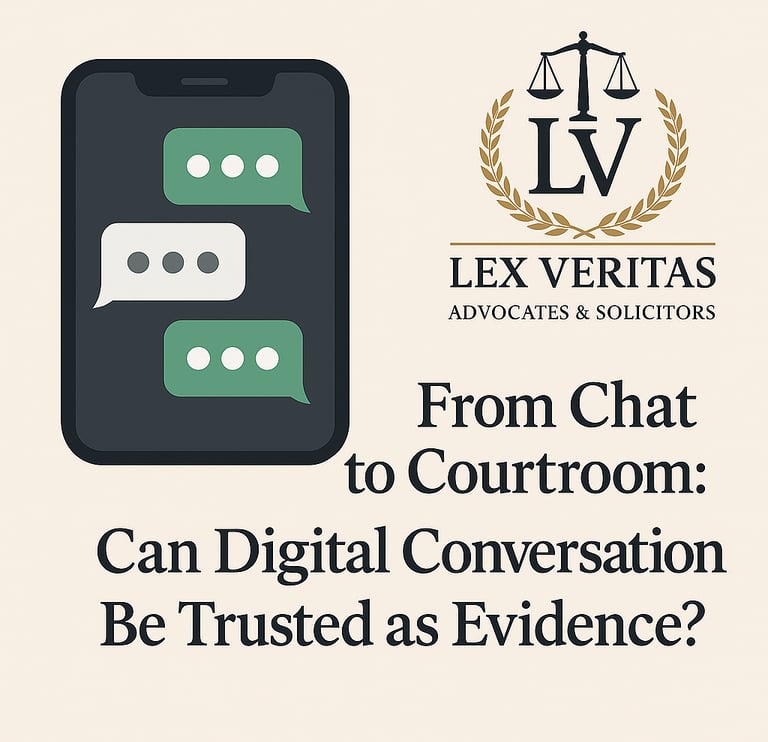From Chat to Courtroom: Can Digital Conversations Be Trusted as Evidence?
In today’s digital era, our conversations often take place on messaging apps like WhatsApp. Whether it’s confirming a business deal, discussing finances, or settling personal matters, people rely heavily on digital communication. So, it’s no surprise that during a legal dispute, many try to use WhatsApp messages or screenshots as proof. But can Indian courts legally accept such digital evidence?
7/28/20252 min read


Digital evidence includes any information stored or transmitted electronically, such as WhatsApp messages, emails, screenshots, call records, or social media posts. These can be crucial in legal cases. However, since digital content can be easily edited, deleted, or manipulated, courts must verify its authenticity before accepting it as valid evidence.
This is where Section 61 of the Bharatiya Sakshya Adhiniyam, 2023 (previously Section 65B of the Indian Evidence Act, 1872) comes in. According to this section, for any electronic record like a WhatsApp chat or screenshot to be admissible in court, it must be accompanied by a Section 61 certificate. This certificate confirms the authenticity of the electronic evidence, explains how it was obtained, and states that the data was not tampered with. Without this certificate, a screenshot or printout usually cannot be accepted unless the original device, such as the phone or computer from which it came, is submitted in court.
The importance of this rule was firmly established in the case of Arjun Panditrao Khotkar v. Kailash Gorantyal (2020), where the Supreme Court of India ruled that the certificate (then under Section 65B, now mirrored in Section 61 BSA) is mandatory. The Court overruled earlier, more relaxed interpretations, and made it clear that digital evidence without the certificate or the original device will not be considered admissible. This ruling changed the way electronic records are treated in Indian courts.
But are WhatsApp messages really reliable? The challenge with using WhatsApp chats as evidence lies in the fact that they can be easily altered. Messages can be deleted, edited, or forwarded. Screenshots can be photoshopped. Even WhatsApp itself does not store message content due to its end-to-end encryption. As a result, courts are generally cautious. They may accept WhatsApp messages, but often only as supporting evidence, especially if both parties don’t dispute the content or if there is additional documentation to back it up.
To present digital/electronic evidence, it’s important to understand how to present it properly. First, the original device needs to be kept safe and unmodified. Secondly, a valid Certificate under Section 61 of the Bharatiya Sakshya Adhiniyam has to be filed by the person or organization who extracted the data (such as an IT expert or mobile service provider). Thirdly, it may be a best practice to avoid relying only on screenshots and it is best to support them with additional proof like emails, transaction receipts, or witness statements.
In conclusion, Indian courts do accept WhatsApp messages and screenshots as evidence but not without scrutiny. The evidence must be verified through the correct legal channels, particularly under Section 61 of the Bharatiya Sakshya Adhiniyam, 2023. Without this certification, the digital messages may not hold up in court, no matter how convincing they seem. Hence, mere presence and filing of the digital evidence itself does not support the case it is also equally important to present them in compliance with the provisions of the BSA.
Integrity
Empowering clients with clarity and legal expertise.
Contact
Subscribe Us
info@lexveritaslegal.com
+91 73968 72581
© 2025. All rights reserved. Powered by Itformula1


